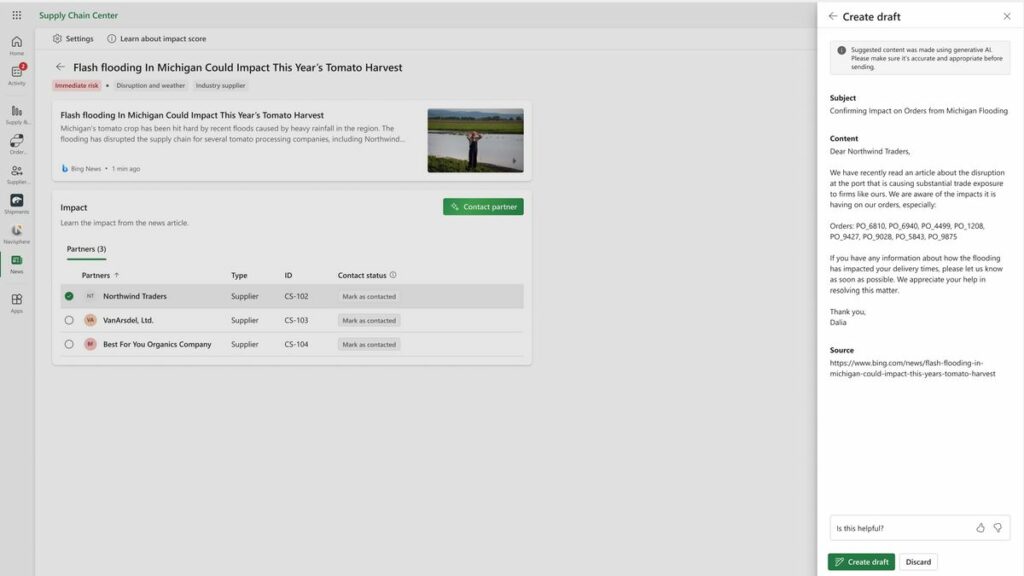How Microsoft Copilot Helps with Supply Chain Risk Assessment
AI Powered Copilot helps Supply Chain Managers get to the bottom of risk assessment. Don’t miss this opportunity to take your organization to the next level.
AI Powered Copilot helps Supply Chain Managers get to the bottom of risk assessment. Don’t miss this opportunity to take your organization to the next level.
The global supply chain continuously evolves—striving to achieve the most significant advantages in efficiency, cost reduction, and customer satisfaction. However, it faces increasing complexities due to growing customer expectations, rapid market fluctuations, and a rising need for sustainable practices. Microsoft Copilot can assist in Supply Chain Risk assessment.
Supply chains have been a prime area for the application of AI, due to the vast amounts of critical business data and processes involved. Yet, while statistical models have been used in processes such as inventory management, forecasting, production planning, and scheduling, there hasn’t been a significant shift in the industry beyond improving algorithms. Learning hasn’t been applied to make supply chain processes intelligent and self-regulating. The next generation of AI will transform the industry by making it more agile, efficient, and responsive to changes.
Artificial intelligence, particularly generative AI, offers promising solutions to address these challenges. By leveraging the power of generative AI, supply chain stakeholders can analyze massive volumes of data, generate valuable insights, and facilitate better decision-making processes. Microsoft introduced new artificial intelligence capabilities to its supply chain management that will allow shippers to flag and respond to potential disruptions, with its new solution, Dynamics 365 Copilot.
Stephanie Dart, senior director of product marketing for ERP, finance and supply chain at Microsoft, recently discussed the challenges supply chain managers face when it comes to manual data entry and time-consuming processes: “Order responses oftentimes require changes to ordered quantities, delivery dates, or products delivered,” Dart wrote. “Today, procurement professionals must review the changes for individual orders one by one to identify the risk to plan and potential downstream impacts.” With Copilot, “users are able to efficiently handle changes to purchase orders at scale and assess the impact and risk to help optimize procurement decisions.”
Supply chain managers can use Copilot within Microsoft’s Supply Chain Center platform to track potential risks such as weather, and then generate predictive insights. Once Copilot flags an external risk, supply chain planners can then draft an email to suppliers using AI to send alerts and mitigate potential disruptions, Ray Smith, Microsoft’s vice president of supply chain, business applications and platforms, told Supply Chain Dive.
Copilot, which can also be applied to other Microsoft business applications, aims to help busy supply chain managers quickly make sense of massive amounts of data, Smith also told Supply Chain Dive.
When you’ve got large volumes of data and busy supply chain managers, AI is needed to help elicit problems and risks, and propose mitigation plans, he added.
“A lot of people in the supply chain would say they don’t have time … to look at dashboards if there’s potential data there, let alone engage the suppliers in something that potentially may happen,” Smith said. “The generative AI — the email, communications and business contexts — allows us to really expedite that mitigation and the engagement with the suppliers.”
First, the AI algorithm scans news articles and takes other steps to identify any potential risk that may impact suppliers or partners across a network, such as geopolitical or financial risk. From there, an AI-drafted message can be sent to suppliers asking whether they expect any disruption and to confirm if purchase orders will be impacted. For example, if there’s a weather event in the Pacific Northwest, AI will determine which of your suppliers and customers will be affected and will generate an email for you alerting all affected parties. You simply review the email and click send.
“The supplier can then close the loop by replying back, and collaborating,” Smith said.

The alert above warns the supply chain manager of flash flooding in Michigan which could impact the tomato harvest. You can see the sample draft email alerting suppliers/customers.
“I would say that probably the biggest thing that customers and clients are looking for from Copilot is efficiency gains,” says Daryl Moll, principal cloud architect at Velosio. “And then the second piece is, kind of the X Factor of ‘tell me what I don’t know,’ which means they’re looking for AI solutions like Copilot to give them insights into their data that they didn’t know or didn’t know how to ask to lead them down the right path,” continues Moll.
Velosio is here to help you navigate Copilot, explore its capabilities, and maximize its value to your organization. We’re leveraging our elite status with Microsoft and deep AI and supply chain expertise to stay out in front of the technology and help you better understand its capabilities and how to incorporate them into your business. Our experienced consultants can answer your questions, provide in-depth demonstrations, and help you discover how this powerful tool can transform your business.
Don’t miss this opportunity to take your organization to the next level. Reach out today and learn more about Microsoft Copilot and our other services.
Talk to us about how Velosio can help you realize business value faster with end-to-end solutions and cloud services.